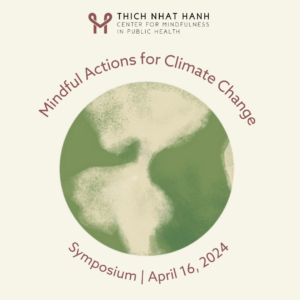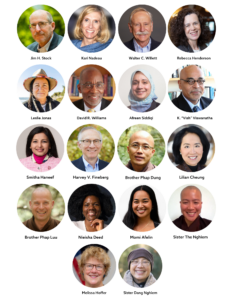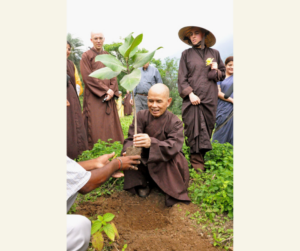Mindful Actions for Climate Change Symposium
 In an era where the impact of human activities on the planet has reached critical levels, we come together to explore and promote mindful actions for climate change mitigation and adaptation. This symposium aims to bridge the gap between research, policy, and public awareness, fostering collaboration and inspiring actionable steps toward a sustainable future. As the urgency to address climate change intensifies, this symposium serves as a platform for interdisciplinary discussions, innovative solutions, and collective mindfulness towards sustainable practices and individual behavior change.
In an era where the impact of human activities on the planet has reached critical levels, we come together to explore and promote mindful actions for climate change mitigation and adaptation. This symposium aims to bridge the gap between research, policy, and public awareness, fostering collaboration and inspiring actionable steps toward a sustainable future. As the urgency to address climate change intensifies, this symposium serves as a platform for interdisciplinary discussions, innovative solutions, and collective mindfulness towards sustainable practices and individual behavior change.
The day-long symposium will bring together leading academics, community leaders and activists, practitioners of mindfulness, and monastics who studied under Thich Nhat Hanh.
Join us for an inspiring and informative day of discussion, networking, and mindfulness.
This event is free and open to the public through an online webinar.
Please register here by end of day on April 14th!


VIRTUAL SYMPOSIUM SCHEDULE
*Please note this schedule has been modified for virtual attendance. Those attending in person have a slightly different schedule.
Registration & Welcome
8:45 – 8:50 a.m. Welcome from Dr. Harvey Fineberg
8:50 – 8:55 a.m. Mindful Breathing
8:55 – 9:05 a.m. Opening Remarks from Dr. Lilian Cheung
9:05 – 9:15 a.m. Opening Remarks from Dr. Walter Willett
Session 1: The Science & Practice of Global Initiatives
9:15 – 9:20 a.m. Introduction of Session 1 from Dr. Harvey Fineberg
9:20 – 9:40 a.m. Dr. Walter Willett
9:40 – 10:00 a.m. Dr. Rebecca Henderson | “Mindfulness, Climate & Business: Emerging Approaches”
10:00 – 10:20 a.m. Dr. Kari Nadeau | “Climate and Health and Wellness”
10:20 – 10:25 a.m. Summary of Session 1 from Dr. Harvey Fineberg
Break
10:30 – 10:50 a.m. Break & Conversation
Session 2: Transformative Climate Action in Academia
10:50 – 10:55 a.m. Introduction of Session 2 from Dr. Harvey Fineberg
10:55 – 11:15 a.m. Dr. Jim Stock
11:15 – 11:25 a.m. Dr. David Williams | “Physical/Chemical Exposures and their Potential to Exacerbate Social Inequities in Health: The Case of Early Childhood Development”
11:25 – 11:45 a.m. Dr. Afreen Siddiqi | “Goal-seeking structures for adapting socio-technical systems”
11:45 – 12:05 p.m. Smitha Haneef | “Designing hospitality programs to promote healthy diets from sustainable food systems”
12:05 – 12:10 p.m. Summary of Session 2 from Dr. Kari Nadeau
Lunch & Break
12:10 p.m. Lunch Break
1:40 p.m. Mindful Breathing
Session 3: Imperatives for Action
1:40 – 1:45 p.m. Introduction of Session 3 from Dr. Harvey Fineberg
1:45 – 2:05 p.m. Dr. K. “Vish” Viswanath
2:05 – 2:20 p.m. Leslie Jonas | “Mindfulness in Cultural Respect and Traditional Ecological Knowledge”
2:20 – 2:40 p.m. Melissa Hoffer
2:40 – 3:00 p.m. Sister The Nghiem (Sister True Vow)
3:00 – 3:30 p.m. Community Reflection Panel featuring Sister Dang Nghiem, Brother Phap Luu, Brother Phap Dung, Nieisha Deed, Momi Afelin, and Leslie Jonas
Mindful Reflections & Closing Remarks
3:30 – 4:00 p.m. Comments & Questions from Audience, moderated by Drs. Walter Willett & Kari Nadeau
4:00 – 4:20 p.m. Monastic Chant & Great Bell Chant
SYMPOSIUM PRESENTERS & MODERATORS
Momi Afelin, MPH
Alumni, Harvard T.H. Chan School of Public Health
Lilian Cheung, ScD
Lecturer, Director of Health Promotion & Communication, and Director of Mindfulness Research and Practice, Department of Nutrition, Harvard T.H. Chan School of Public Health
Nieisha Deed
Founder and CEO of PureSpark, Boston
Brother Phap Dung
Monastic Disciple of Zen Master Thich Nhat Hanh
Smitha Haneef, MS
Managing Director for Harvard University Dining Services, Harvard University
Rebecca Henderson, PhD
John and Natty McArthur University Professor, Harvard University Co-Director, Business & Environment Initiative, Harvard Business School
Harvey V. Fineberg, MD, PhD
President of the Gordon and Betty Moore Foundation
Melissa Hoffer, MEd, JD
Massachusetts’ First Climate Chief
Leslie Jonas, MS
Indigenous Land and Water Conservationist and Elder Eel Clan member of the Mashpee Wampanoag Tribe
Brother Phap Luu
Monastic Disciple of Zen Master Thich Nhat Hanh
Kari Nadeau, MD, PhD
Chair of the Department of Environmental Health at Harvard School of Public Health and John Rock Professor of Climate and Population Studies, Harvard T.H. Chan School of Public Health
Sister Dang Nghiem, MD
Monastic Disciple of Zen Master Thich Nhat Hanh
Sister The Nghiem
Monastic Disciple of Zen Master Thich Nhat Hanh
Afreen Siddiqi, SM, PhD
Research Scientist in the Department of Aeronautics and Astronautics, Massachusetts Institute of Technology
James H. Stock, MS, PhD
Vice Provost for Climate and Sustainability and Director of the Salata Institute for Climate and Sustainability at Harvard University, and the Harold Hitchings Burbank Professor of Political Economy, Faculty of Arts and Sciences, Harvard University
K. “Vish” Viswanath, PhD
Lee Kum Kee Professor of Health Communication and Director of the Lee Kum Sheung Center for Health and Happiness, Center for Translational Health Communication Science, and Harvard Chan India Research Center, Harvard T.H. Chan School of Public Health
Walter C. Willett, MD, MPH
Director of the Thich Nhat Hanh Center for Mindfulness in Public Health and Professor of Epidemiology and Nutrition, Harvard T.H. Chan School of Public Health
David R. Williams, MA, MPH, PhD
Norman Professor of Public Health and Chair of the Department of Social and Behavioral Sciences, Harvard T.H. Chan School of Public Health
MONASTIC PARTICIPANTS
Brother Phap Dung
Brother Phap Luu
Brother Nam Sac
Brother Minh An
Brother Minh Niem
Brother An Dinh
Brother Phap Khong
Brother Phap Chung
Sister The Nghiem
Sister Dang Nghiem
Sister Tinh Nghiem
Sister Tinh Nghiem
Sister Quynh Nghiem
Sister Hoc Nghiem

THICH NHAT HANH
Thich Nhat Hanh was a Zen master, a peace activist, a teacher, and a driving force behind the introduction of mindfulness to the Western world.
We are proud to have our Center named for this soft-spoken Buddhist monk, who devoted his long life to refining the practice of mindfulness and sharing those insights with the world. Thich Nhat Hanh (or “Thay,” which means teacher in Vietnamese) teaches us to live fully in the here and now, to recognize our connections with those around us, and to act with purpose to preserve and protect our planet. We hope our Center will spread those values around the world through the study and teaching of mindfulness.
Born in Vietnam in 1926, Thich Nhat Hanh entered a Buddhist monastery at age 16. A life of contemplation suited him, yet in viewing the suffering in the world, he also felt compelled to speak up, mobilize, and actively work toward a better future. In so doing, he founded the “engaged Buddhism” movement. Throughout the Vietnam War, Thich Nhat Hanh traveled tirelessly to spread the principles of nonviolence, compassion, and solidarity, working alongside activists such as Dr. Martin Luther King, Jr., who nominated the Buddhist monk for a Nobel Prize at the height of the war. In his home country, meanwhile, Thich Nhat Hanh put his principles into action by founding an all-volunteer relief organization, known as the School of Youth and Social Service. Because of his activism, Thich Nhat Hanh was exiled from Vietnam.
In November 2018, after suffering a stroke in 2014, Thich Nhat Hanh returned to Từ Hiếu Temple in Huế, Vietnam, where he ordained. He expressed a wish to stay there for his remaining days. At the age of 95, Thich Nhat Hanh passed away peacefully in the early moments of January 22, 2022, in the Deep Listening Hut at Từ Hiếu Temple, surrounded by loving disciples.
THICH NHAT HANH CENTER FOR MINDFULNESS IN PUBLIC HEALTH
Our Vision
We envision a healthier and sustainable world, where people are mindful of their connections with all others and our planet.
Our Mission
The Thich Nhat Hanh Center for Mindfulness in Public Health aims to:
1. Pursue evidence-based approaches to improving health and wellbeing through mindfulness by undertaking rigorous, scientific inquiry; and,
2. Provide mindfulness education and training for the Harvard community and beyond.
By pursuing these dual tracks of academic research and public engagement, we aim to improve public health and inspire global action.

* Harvard Chan School hosts a diverse array of speakers, invited to share both scholarly research and personal perspectives. They do not speak for the School, and hosting them does not imply endorsement of their views, organizations, or employers.
To stay on top of on all our news, subscribe here for email updates.
SubscribeTo stay on top of on all our news, subscribe here for email updates.
Subscribe